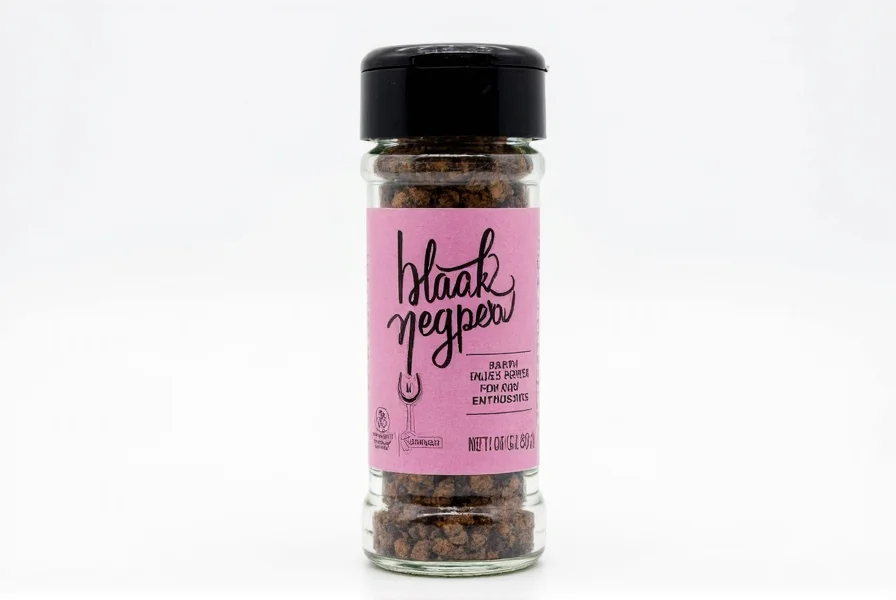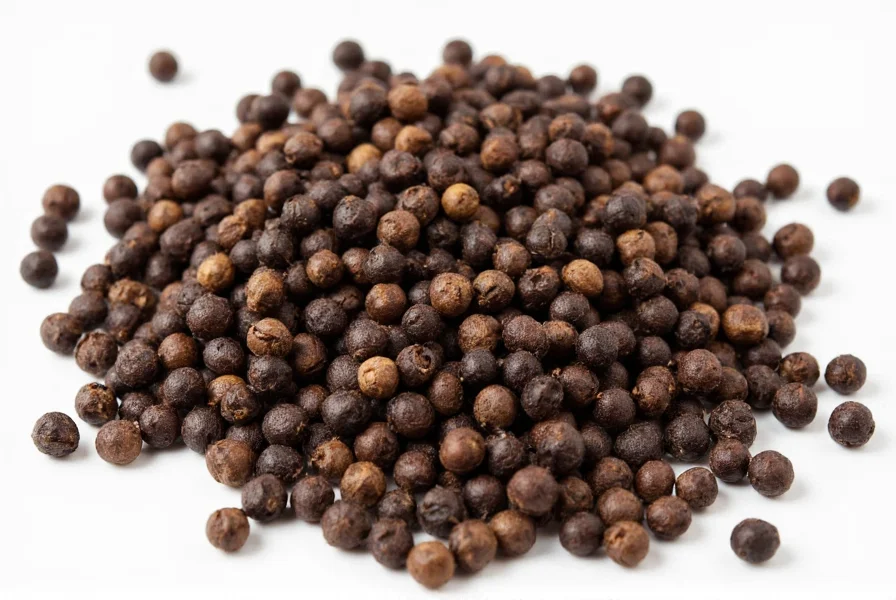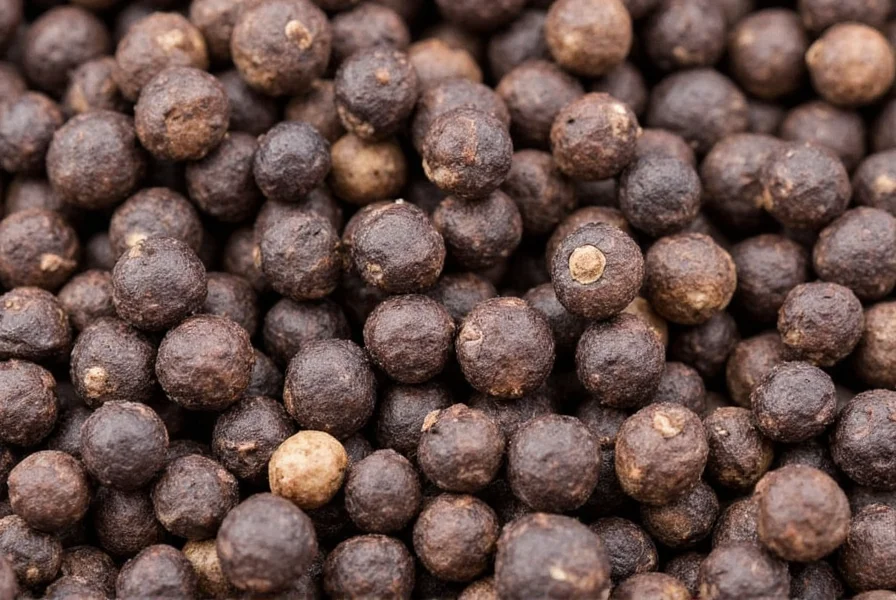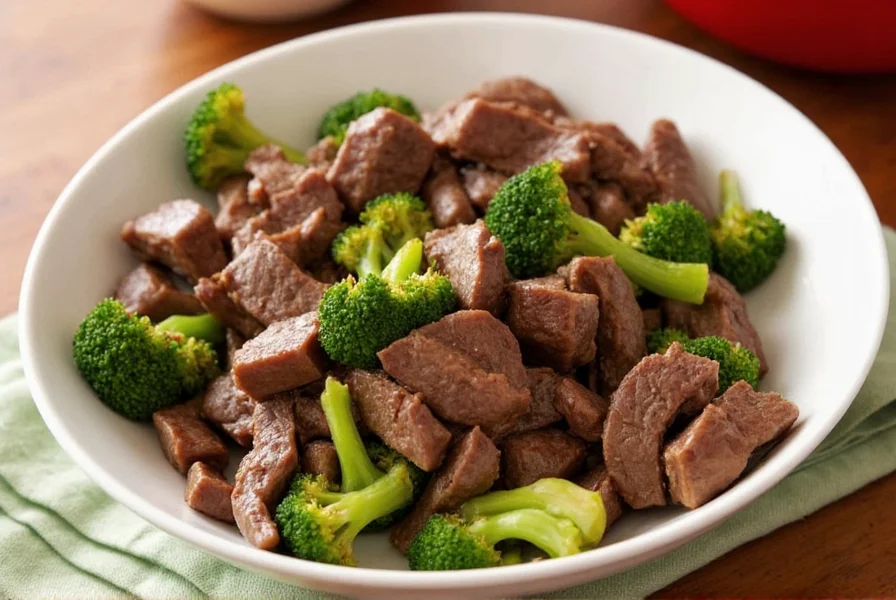Table of Contents
What Is Coarse Black Pepper?
Coarse black pepper refers to black peppercorns that are either sold whole or ground into larger particles. It is not a distinct variety but a processing difference from fine ground pepper. Whole black peppercorns are the dried berries of the Piper nigrum plant, and coarse grinding preserves more natural oils and aromas, resulting in a more intense flavor and texture. This form is preferred for dishes where pepper's bold character should stand out, such as hearty stews or grilled meats.

Unlike white pepper, which is made by removing the outer layer of the peppercorn, coarse black pepper retains the full outer layer of the mature fruit. The term "coarse" describes the particle size, not the harvest time or plant type. This distinction is important for accurate culinary use.
Flavor Profile of Coarse Black Pepper
Coarse black pepper delivers a robust, pungent flavor with sharp spiciness and a lingering aromatic quality. Its larger particles release flavor gradually during cooking, adding depth without overwhelming delicate dishes. It has subtle fruity and earthy notes that enhance savory recipes.
Here's a comparison between coarse black pepper and fine ground black pepper:
| Feature | Coarse Black Pepper | Fine Ground Black Pepper |
|---|---|---|
| Size | Larger, coarser grains | Smaller, finer powder |
| Flavor Intensity | Stronger, more pronounced | Milder, more balanced |
| Use Case | Stews, marinades, roasted meats | Everyday seasoning, sauces, dressings |
| Texture | Crispy when whole; coarse when ground | Fine, powdery |
How to Use Coarse Black Pepper
Using coarse black pepper effectively requires attention to timing and technique. Here are expert-recommended practices:
- Grind fresh: For maximum flavor, use a mortar and pestle or spice grinder to crush whole peppercorns just before adding to dishes. This preserves volatile oils.
- Add toward the end: To retain aromatic qualities, incorporate coarse pepper in the final minutes of cooking. Prolonged heat can diminish its complexity.
- Pair with robust ingredients: It complements hearty dishes like grilled steak, root vegetables, and rich soups. Avoid delicate items like seafood or salads where it may overpower.
- Use in rubs and marinades: Its texture adheres well to proteins, creating flavorful crusts for meats. Mix with salt, herbs, and spices for optimal results.

Buying Guide: Finding the Best Coarse Black Pepper
When selecting coarse black pepper, prioritize quality indicators based on USDA spice guidelines:
- Origin: High-quality peppercorns come from regions like India (Malabar), Vietnam, or Indonesia. Look for "whole black peppercorns" or "coarse ground" labels.
- Quality: Uniform size, deep black color, and no mold or discoloration. Fresh peppercorns should have a strong, clean aroma—avoid musty or stale-smelling products.
- Storage: Store in an airtight container away from light and heat. Whole peppercorns retain freshness for 2-3 years; pre-ground versions last 6 months.
Reputable brands known for consistent quality include:
- Penzeys Spices Coarse Ground Black Pepper: Sourced from premium origins, with robust flavor and no additives.
- Douglas & Co. Whole Black Peppercorns: Ideal for grinding, offering intense aroma and consistent size.
- McCormick Coarse Ground Black Pepper: Reliable for everyday use, with pure peppercorn content and no fillers.

Common Mistakes When Using Coarse Black Pepper
Even experienced cooks can misapply coarse black pepper. Avoid these pitfalls:
- Overusing: Due to concentrated flavor, start with half the amount you'd use for fine pepper. Adjust incrementally to taste.
- Improper grinding: Inadequate grinding fails to release full flavor. Use a dedicated spice grinder for even coarse particles.
- Using in delicate dishes: Its intensity can overwhelm light meals like fish or salads. Reserve for robust recipes where it enhances complexity.
- Incorrect storage: Exposure to air, light, or heat rapidly degrades quality. Always seal containers tightly in cool, dark places.

Conclusion
Coarse black pepper offers a powerful, nuanced flavor that elevates savory dishes when used correctly. Its larger particles provide texture and aroma that fine ground pepper cannot match. By understanding its characteristics and following best practices, you can harness its full potential in your cooking. Remember: quality and freshness are key—always choose whole peppercorns and grind just before use for the best results.
Frequently Asked Questions (FAQ)
Here are answers to common questions about coarse black pepper:
- Q: Is coarse black pepper a different type of pepper plant?
A: No, coarse black pepper comes from the same Piper nigrum plant as regular black pepper. The difference lies in the grinding process—coarse pepper has larger particles that retain more natural oils and aroma. - Q: How does coarse black pepper differ from regular black pepper?
A: Coarse black pepper has larger, uneven grains that deliver stronger flavor and texture. Regular fine ground pepper is uniform and powdery, making it better for everyday seasoning. Coarse pepper is ideal for hearty dishes where pepper should stand out. - Q: Can I substitute coarse black pepper for regular black pepper in recipes?
A: Yes, but reduce the amount by about 50% due to its concentrated flavor. Always taste and adjust gradually to avoid overpowering the dish. - Q: Where can I find authentic coarse black pepper?
A: Look for "whole black peppercorns" or "coarse ground" labels at specialty spice shops or reputable retailers like Penzeys, Douglas & Co., or McCormick. Check for freshness indicators like strong aroma and uniform color. - Q: How long does coarse black pepper stay fresh?
A: Whole peppercorns retain peak freshness for 2-3 years when stored in an airtight container away from light and heat. Pre-ground coarse pepper loses potency within 6 months. - Q: Why isn't my coarse black pepper as flavorful as expected?
A: Flavor diminishes when exposed to air or heat. Always grind peppercorns fresh before use, and store them in sealed containers in a cool, dark place to maintain maximum intensity.










 浙公网安备
33010002000092号
浙公网安备
33010002000092号 浙B2-20120091-4
浙B2-20120091-4